Few have a true awareness of how much stress actually affects their life. Frequently we don’t even recognize it.
Many think of stress as “having a meltdown” but that’s often not the case. I seldom, if ever, have a meltdown, but I’ve learned to tune in to and recognize the effects of stress on my body and in my life on a daily basis.
Stress is often found in the little things. For example, responsibility itself is stressful. When we must make decisions and bear the consequences of the outcome, it affects us.
When you’re in a meeting and your performance is criticized or your ideas aren’t accepted you may feel defensive. This attitude is a good indicator that stress is already at work in your body.
Or you give your spouse or partner a hug or kiss and they don’t respond like they normally do. Notice how your body feels when you notice a tinge of rejection – that’s stress rearing its head once again.
Just like the common “low stressor” example of sitting in traffic when you’re running late, these aren’t real life-or-death moments. Yet our adrenal glands start pumping out fight-or-flight, blood pressure-raising adrenaline all the same.
We could say it’s a matter of managing expectations and responses, a la “Don’t Sweat the Small Stuff.” And there’s some merit to that. If you’re experiencing frequent high stress, then a lifestyle change could be in order.
But that doesn’t change the fact we will have moments of stress virtually every day anyhow. That means the answer for many of us isn’t in avoiding stress, but in how we help our bodies process it out.
Monitor Artificial Stimulants
Or, perhaps you’re like me, and are unknowingly blocking your body’s ability to recharge your adrenals through artificial stimulation.
Some years ago I had some lab tests done because I was feeling exhausted and tired all the time. My testing showed my hormones were off, adrenals burnt out and cortisol levels out of whack. By that I mean when my cortisol level was supposed to spike in the morning to give me energy, it didn’t. Instead, it spiked in the evening. So I’d be bleary-eyed all morning long and unable to go to sleep at night.
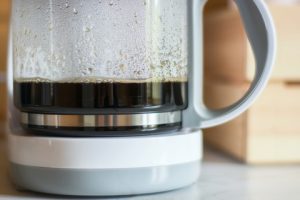 That’s a common symptom after prolonged periods of stress… and to those whose bodies have become addicted to caffeine.
That’s a common symptom after prolonged periods of stress… and to those whose bodies have become addicted to caffeine.
Our yoga teacher reminded us that if you’re tired and need to grab a cup of coffee, and the only way you can rise to the occasion is to get caffeine, what you’re doing is forcing your body through artificial stimulus, which only fatigues you more after the caffeine wears off.
Considering at least 80% of Americans regularly consume caffeine, primarily through coffee, tea, soda, and energy drinks, many have no idea how fatigued their adrenal glands really are. If you’re consuming caffeine on a daily basis, there’s no way you can really feel the true state of your personal energy level because it’s constantly being artificially stimulated.
Worse, your body may metabolize caffeine slower than others. When I did the “23 and me” DNA saliva test, that’s something I discovered about myself. By monitoring my coffee intake I proved its validity through simple experimentation. I’ll bet you’ll find similar results if you’re a regular caffeine consumer and do the same.
With me, caffeine works as a quick pick-me-up. I can have a cup a day for a couple days and still be ok. But after a couple days one cup isn’t enough – I have to increase my intake to two cups for the same result. A week or two later and suddenly I’m drinking three or more cups every day and still not feeling as energetic as I was at the start with one cup. My eyes start burning and the fatigue comes back.
So I cut out the coffee. Yes, I have headaches the first couple days, but I just get more rest, sleep more, and exercise more. After a week of no caffeine I feel great. My energy is stable, no ups and downs, no eyes burning. I feel great and alive.
Then I’ll have a day where I have to do a lot of work. Instead of listening to my body, I’ll get a coffee to help me keep going. I’ll power straight through a 13-hour workday with hardly a break. But that artificial energy kick invariably comes back to bite me. The next day, after pushing myself harder than I should have the prior day using false energy, I feel like crap until I get more coffee. And before I know it I’m back on the rollercoaster again.
Action Step 1: Listen to your body. That means eliminating or at least reducing stimulants like caffeine and sugar so you can recognize what your body is trying to tell you.
Bonus Tip: Get your own DNA saliva test done at www.23andme.com. Their Health + Ancestry Service test is now much cheaper than when I did it.
Adaptogenic Herbs
The next tip comes from one of our Healthy Back Institute team members. He had been experiencing frequent chest and neck pain, difficulty breathing and severe headaches for a couple months. One time, while driving, it became so bad he pulled to the side of the road for the symptoms to subside then went to the emergency room concerned he was having a heart attack.
Extensive testing showed he had no heart trouble. Rather, it was a stress-induced panic attack, which can have symptoms mimicking a heart attack.
Finally recognizing the symptoms were stress-related, he took steps to reduce stress by decreasing his caffeine intake, starting a better sleep regimen and becoming more mindful of when he felt particularly stressed (sometimes a panic attack can be avoided by simply recognizing the symptoms as non-life threatening). And he started taking one of the most powerful supplements for adrenal support and stress reduction: ashwagandha.
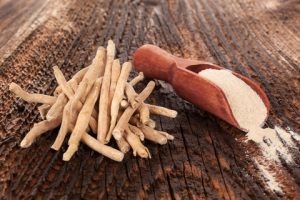 Sometimes called Indian ginseng or winter cherry, ashwagandha (Withania somnifera) has been used for more than 2,500 years as a “vitalizer” in Ayurvedic medicine. Modern research has shown it to be one of the world’s most powerful adaptogens.
Sometimes called Indian ginseng or winter cherry, ashwagandha (Withania somnifera) has been used for more than 2,500 years as a “vitalizer” in Ayurvedic medicine. Modern research has shown it to be one of the world’s most powerful adaptogens.
Adaptogens support your adrenal gland by helping normalize the wild variations in hormones which accompany the stress response by increasing their effect when low and blocking their effect when high.
As a side note, this herb is useful for much more than anxiety. Besides its stress-relieving function, ashwagandha also helps prevent memory loss by modifying how the brain uses acetylcholine (your brain will destroy its own cells to acquire acetylcholine when oxygen levels are low). And the alkaloids and anoloids in ashwagandha provide a real benefit in the bedroom to guys with sexual stamina and premature ejaculation issues.
Action Step 2: Take a daily ashwagandha supplement. Most studies use at least 300mg taken once or twice daily. Our team member took a supplement with 500mg of ashwagandha root and 70mg of ashwagandha root extract twice daily until anxiety symptoms subsided (he said it was effective within a week) and now takes it once a day.
Bonus Tip: Other great adaptogenic herbs you could try include Asian ginseng (Panax ginseng), rhodiola (Rhodiola rosea) and astragalus root (either Astragalus membranaceus or Astragalus mongholicus).
Progressive Muscle Relaxation
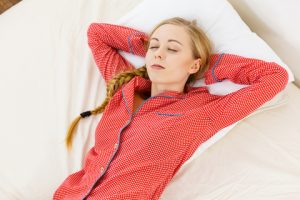 One of my favorite ways to quickly reduce stress in my body is to go through a five-minute progressive muscle relaxation exercise. If you’d like to give it a try, here’s the technique I use, step-by-step:
One of my favorite ways to quickly reduce stress in my body is to go through a five-minute progressive muscle relaxation exercise. If you’d like to give it a try, here’s the technique I use, step-by-step:
- Lie on your back, on your bed or another comfortable spot, and close your eyes.
- Feel your feet. Sense their weight. Consciously relax them and sink into the bed. Start with your toes and progress to your ankles.
- Feel your knees. Sense their weight. Consciously relax them and feel them sink into the bed.
- Feel your upper legs and thighs. Feel their weight. Consciously relax them and feel them sink into the bed.
- Feel your abdomen and chest. Sense your breathing. Consciously will them to relax. Deepen your breathing slightly and feel your abdomen and chest sink into the bed.
- Feel your buttocks. Sense their weight. Consciously relax them and feel them sink into the bed.
- Feel your hands. Sense their weight. Consciously relax them and feel them sink into the bed.
- Feel your upper arms. Sense their weight. Consciously relax them and feel them sink into the bed.
- Feel your shoulders. Sense their weight. Consciously relax them and feel them sink into the bed.
- Feel your neck. Sense its weight. Consciously relax it and feel it sink into the bed.
- Feel your head and skull. Sense their weight. Consciously relax them and feel them sink into the bed.
- Feel your mouth and jaw. Consciously relax them. Pay particular attention to your jaw muscles and unclench them if you need to. Feel your mouth and jaw relax and sink into the bed.
- Feel your eyes. Sense if there is tension in your eyes. Sense if you are forcibly closing your eyelids. Consciously relax your eyelids and feel the tension slide off the eyes.
- Feel your face and cheeks. Consciously relax them and feel the tension slide off into the bed.
- Mentally scan your body. If you find any place that is still tense, then consciously relax that place and let it sink into the bed.
Action Step 3: When feeling stressed, take a five-minute break, lie down, and use the progressive muscle relaxation technique I just described.
Bonus Tip: It can be hard to follow these steps and remain relaxed when you’re constantly checking the list of steps, so let someone talk you through it instead. The University of Maryland Medical Center offers a free five-minute audio to guide you through the process. Download the free audio from their website at www.umms.org/midtown/health-services/sleep-disorders/patient-information/audio.
Like This Article?
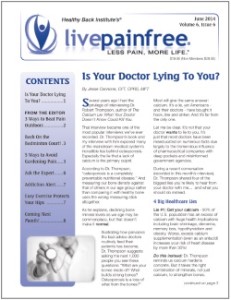 If you liked this article, you’ll LOVE the premium members-only content available only to subscribers of Live Pain Free®, our monthly print + CD publication. This article first appeared in the May 2017 issue.
If you liked this article, you’ll LOVE the premium members-only content available only to subscribers of Live Pain Free®, our monthly print + CD publication. This article first appeared in the May 2017 issue.
What else have you been missing? Find out with a 30-day free trial subscription including immediate access to our entire 10-year archive of more than 100 audio interviews, PDFs of all back issues, numerous special reports and more!
Bonus! Accept a no-risk free trial subscription today and we’ll also rush you our popular Pilates Made Easy DVD along with your free first issue just for taking a look. Yours to keep no matter what you decide!
>> Yes! I’m interested in a FREE 30-day Trial of Live Pain Free + FREE Pilates Made Easy DVD (Click Here to Learn More) <<
References
Somogyi L. Caffeine Intake by the U.S. Population. The Food and Drug Administration. 2010 Aug.
Balch P. Prescription for Herbal Healing, 2nd ed. 2012.
Bongiorno P. Ashwagandha for Anxiety. Psychology Today. 2014 Jan 8.

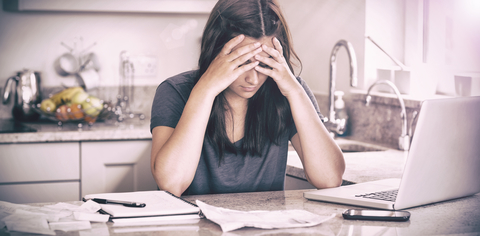

Beautiful and refreshing. Life saver.
You left out the most important Stress Releiver.! SEX!!!!!
Gary Moore
Thank You! The Step by step Muscle relaxation was amazing.